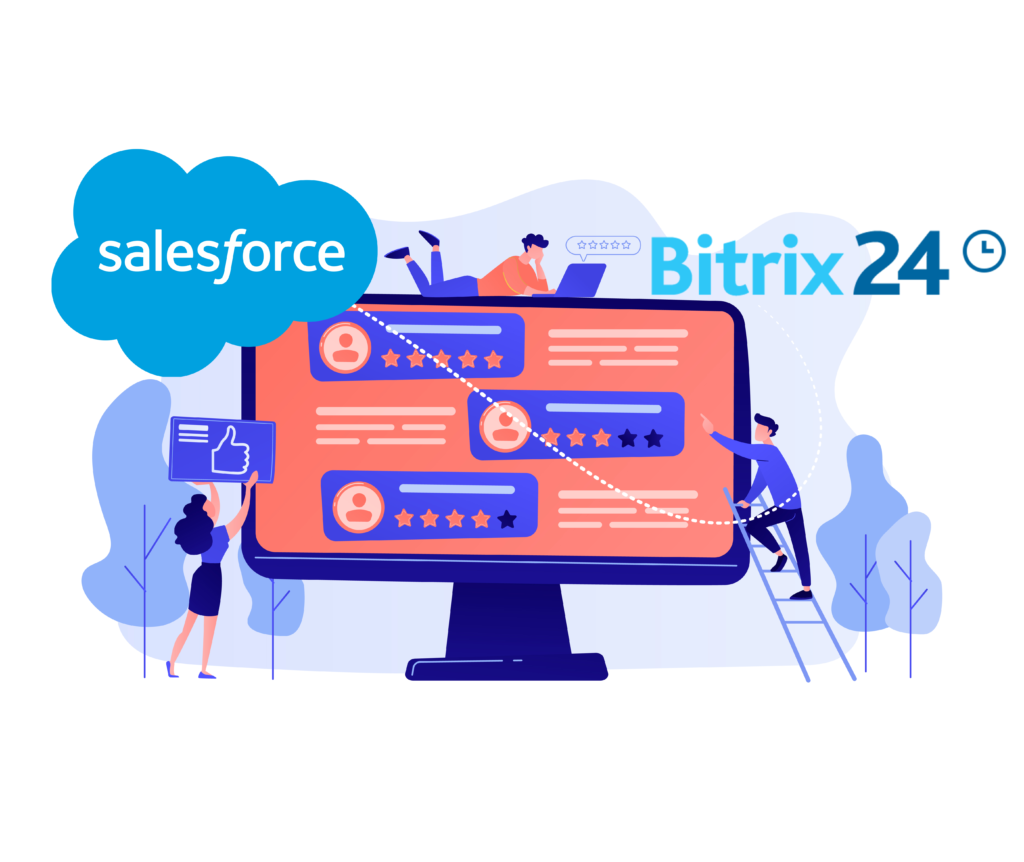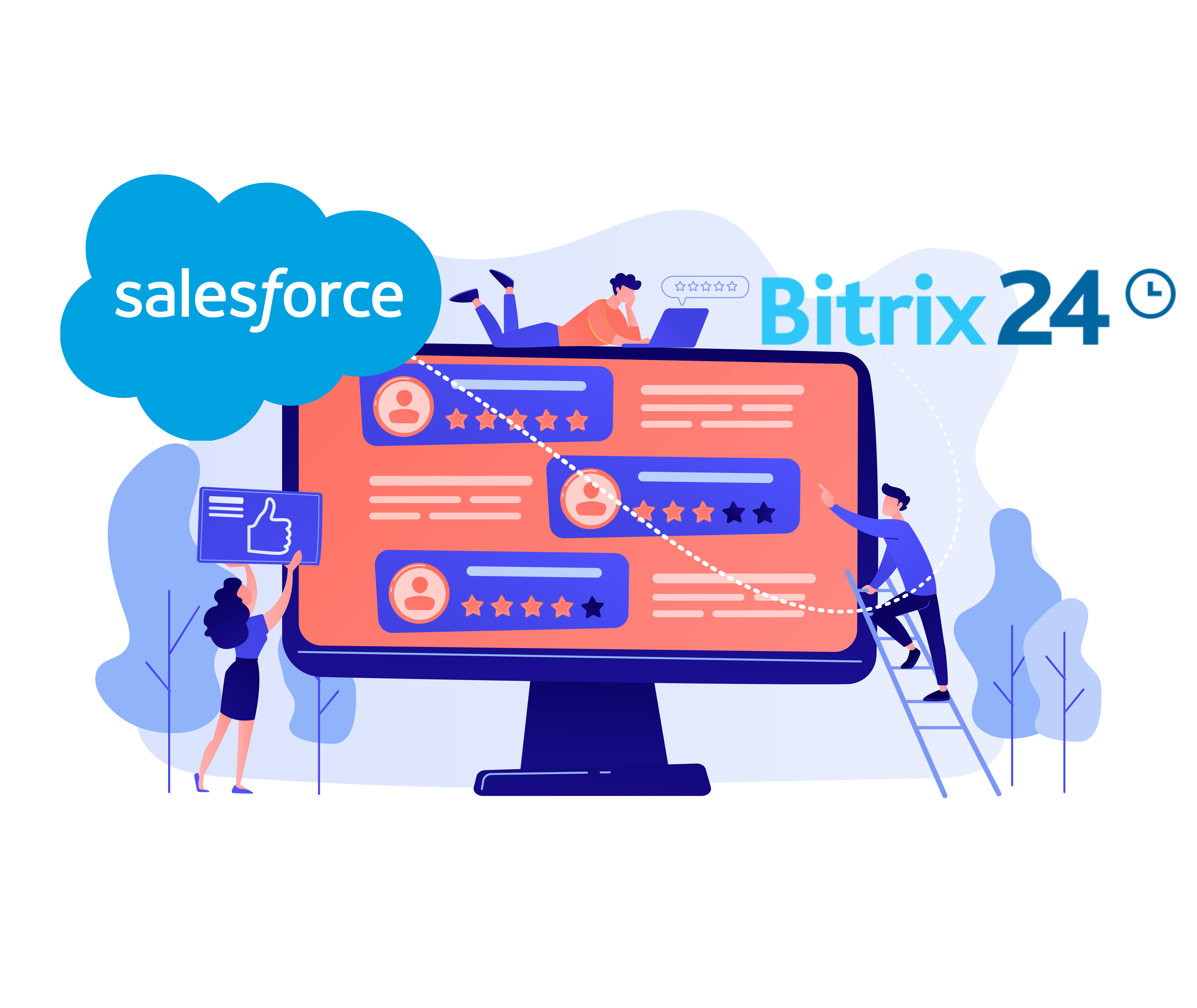Salesforce vs Bitrix24: Which CRM is Right for You?
Customer relationship management (CRM) software is essential for any business that wants to manage and analyze its customer interactions and data. Two popular CRM options are Salesforce and Bitrix24. Both platforms offer a range of features and capabilities, but which one is right for your business? In this article, we’ll compare Salesforce vs Bitrix24 to help you make an informed decision.

Salesforce vs Bitrix24: Overview
Salesforce is a cloud-based CRM platform that has been around since 1999. It offers a wide range of features, including lead management, opportunity tracking, marketing automation, and customer analytics. Salesforce is designed for businesses of all sizes, and its pricing starts at $25 per user per month.
Bitrix24, on the other hand, is a newer CRM platform that was launched in 2012. It is also cloud-based and offers features such as lead management, email marketing, project management, and social intranet. Bitrix24 is aimed at small and medium-sized businesses, and it offers a free plan with limited features, as well as paid plans starting at $19 per user per month.
Salesforce vs Bitrix24: Features
When it comes to features, both Salesforce and Bitrix24 offer a wide range of capabilities. Here’s a breakdown of the key features of each platform:
Salesforce:
Lead management: Salesforce offers robust lead management features, including lead scoring, lead nurturing, and lead assignment.
Opportunity tracking: You can track opportunities from creation to close, including deal size, stage, and probability of closing.
Marketing automation: Salesforce offers a suite of marketing automation tools, including email marketing, social media marketing, and advertising.
Customer analytics: You can analyze customer data and create reports on customer behavior, demographics, and buying habits.
Bitrix24:
Lead management: Bitrix24 offers lead capture forms, lead assignment, and lead nurturing tools.
Email marketing: You can create email marketing campaigns and track the success of those campaigns.
Project management: Bitrix24 offers project management tools, including task management, time tracking, and Gantt charts.
Social intranet: Bitrix24 has a built-in social intranet that allows for communication and collaboration between team members.
Salesforce vs Bitrix24: Ease of Use
Both Salesforce and Bitrix24 have a learning curve, but Salesforce is generally considered to be more complex and difficult to use. Salesforce has a steeper learning curve because of its robust features and the fact that it is highly customizable. Bitrix24, on the other hand, is designed to be more user-friendly and intuitive, making it easier for beginners to get started.
Salesforce vs Bitrix24: Pricing
Pricing is an important consideration when choosing a CRM platform. Here’s a breakdown of the pricing plans for Salesforce and Bitrix24:
Salesforce:
Essentials: $25 per user per month
Professional: $75 per user per month
Enterprise: $150 per user per month
Unlimited: $300 per user per month
Bitrix24:
Free: limited features
Start+: $19 per user per month
CRM+: $55 per user per month
Project+: $55 per user per month
Standard: $79 per user per month
Professional: $159 per user per month
Salesforce vs Bitrix24: Integration
Integrations are an important consideration when choosing a CRM platform because they allow you to connect your CRM to other tools and software that your business uses. Here’s a breakdown of the integrations available for Salesforce and Bitrix24:
Salesforce:
Over 5,000 third-party integrations available on the Salesforce AppExchange,including popular tools like Mailchimp, Slack, and Dropbox.
Native integrations with other Salesforce products, such as Salesforce Marketing Cloud and Salesforce Service Cloud.
Bitrix24:
Over 40 third-party integrations available, including tools like Mailchimp, Google Drive, and Zapier.
Native integrations with other Bitrix24 products, such as Bitrix24 Tasks and Bitrix24 Chat.
Salesforce vs Bitrix24: Support
Support is an important consideration when choosing a CRM platform because you want to make sure that you can get help when you need it. Both Salesforce and Bitrix24 offer a range of support options, including documentation, user forums, and email support. However, Salesforce offers additional support options, such as phone support and live chat, which are not available with Bitrix24.
Salesforce vs Bitrix24: Security
Security is always a concern when it comes to business software, especially when it comes to sensitive customer data. Both Salesforce and Bitrix24 take security seriously and offer a range of security features, including SSL encryption and two-factor authentication. Salesforce, however, has more certifications and compliance standards than Bitrix24, including SOC 2, ISO 27001, and HIPAA compliance.
Salesforce vs Bitrix24: Verdict
So, which CRM platform is right for you? It depends on your business needs and budget. If you’re a large enterprise with a need for advanced features and customization options, Salesforce may be the best option for you. However, if you’re a small or medium-sized business with a limited budget and a need for user-friendly software, Bitrix24 may be a better fit.
Overall, both Salesforce and Bitrix24 are great options for businesses looking for a CRM platform. Consider your needs, budget, and preferences when choosing between these two popular CRM options.
Salesforce vs Bitrix24: Pros and Cons
To help you make a more informed decision, here are some of the pros and cons of each platform:
Salesforce:
Pros:
Wide range of features and customization options
Great for enterprise-level businesses with complex needs
Extensive integrations available on the Salesforce AppExchange
Comprehensive security features and compliance standards
Cons:
Expensive pricing, especially for larger businesses
Steep learning curve and complexity may be overwhelming for beginners
Limited support options for lower-tier plans
Bitrix24:
Pros:
User-friendly and intuitive interface
Affordable pricing plans, including a free plan with limited features
Project management tools and social intranet features
Native integrations with other Bitrix24 products
Cons:
Limited third-party integrations compared to Salesforce
Not as customizable as Salesforce
Limited support options, especially for lower-tier plans
Salesforce vs Bitrix24: Final Thoughts
Choosing the right CRM platform is an important decision for any business. While Salesforce and Bitrix24 are both great options, they have different strengths and weaknesses. Consider your business needs, budget, and preferences when choosing between these two platforms.
If you’re a large enterprise with complex needs and a larger budget, Salesforce may be the better option. However, if you’re a small or medium-sized business with a need for user-friendly software and affordable pricing, Bitrix24 may be the better fit.
Ultimately, both platforms offer a wide range of features and capabilities that can help businesses manage their customer relationships and data more effectively. Choose the platform that best suits your business needs and budget, and you’ll be on your way to better customer relationships and increased success.
In conclusion, choosing the right CRM platform can be a daunting task, but with the right information and considerations, you can make an informed decision that best fits your business needs. Both Salesforce and Bitrix24 are powerful CRM platforms with their own unique strengths and weaknesses. While Salesforce offers more advanced features, integrations, and security certifications, Bitrix24 has a more user-friendly interface and affordable pricing options. Ultimately, the decision between Salesforce and Bitrix24 depends on your business needs, budget, and preferences. We hope this article has provided you with a comprehensive overview of Salesforce vs Bitrix24 and helped you make an informed decision on which platform to choose for your business.
Other Alternative
Simply CRM is a cloud-based customer relationship management (CRM) software that is designed to help businesses manage their customer relationships and sales processes. It offers a range of features and tools that can help businesses streamline their sales processes, track customer interactions, and improve customer engagement.
One of the key features of Simply CRM is its contact management tools. The software allows businesses to store all of their customer information in one central location, making it easy to access and update customer records as needed. Businesses can also segment their customer database based on various criteria, such as demographics, purchase history, and engagement level, allowing them to target specific groups with personalized marketing campaigns.
Simply CRM also offers sales pipeline management tools that allow businesses to track their sales processes from start to finish. The software provides a visual pipeline view of all open deals, allowing businesses to see where each deal is in the sales process and identify potential bottlenecks. This can help businesses prioritize their sales activities and focus on deals that are most likely to close.
In addition to its sales pipeline management tools, Simply CRM also offers marketing automation tools that can help businesses streamline their marketing processes. The software allows businesses to create and send email campaigns, track website visitors, and monitor social media engagement, all from within the platform. This can help businesses improve their customer engagement and drive more leads and sales.
Simply CRM also offers a range of other features, including task management tools, team collaboration tools, and reporting and analytics tools. The software is designed to be easy to use, with a simple and intuitive user interface that requires no technical expertise. It also offers a range of integrations with other popular business tools, such as Zapier, Mailchimp, and QuickBooks.
Overall, Simply CRM is a powerful and versatile CRM software that can help businesses of all sizes manage their customer relationships and sales processes more effectively. Its range of features and intuitive user interface make it a popular choice for businesses looking to improve their customer engagement and drive more sales.




